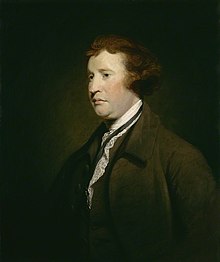Edmund Burke
| Edmund Burke | |
|---|---|

|
|
| Born | 12 January 1729 Dublin, Kingdom of Ireland |
| Died | 9 July 1797 (aged 68) Beaconsfield, Buckinghamshire, Kingdom of Great Britain |
| Alma mater | Trinity College, Dublin |
| Era | Eighteenth century philosophy |
| Region | Western philosophy |
| School | Conservative liberalism, Conservatism |
|
Main interests
|
Social and political philosophy |
|
Influences
|
|
|
Influenced
|
|
|
The Right Honourable Edmund Burke |
|
|---|---|
| Paymaster of the Forces | |
|
In office 1782–1782 |
|
| Preceded by | Richard Rigby |
| Succeeded by | Isaac Barré |
|
In office 1783–1783 |
|
| Preceded by | Isaac Barré |
| Succeeded by | William Grenville |
| Personal details | |
| Born | 12 January 1729 Dublin, Ireland |
| Died | 9 July 1797 (aged 68) Beaconsfield, Buckinghamshire, Great Britain |
Edmund Burke (/bɜːrk/; 12 January [NS] 1729 – 9 July 1797) was an Irishstatesman born in Dublin, as well as an author, orator, political theorist, and philosopher who, after moving to London, served as a member of parliament (MP) for many years in the House of Commons with the Whig Party.
Burke is remembered mainly for his support of the cause of the American Revolutionaries, Catholic emancipation, the impeachment of Warren Hastings from the East India Company, and for his later opposition to the French Revolution, the latter leading to his becoming the leading figure within the conservative faction of the Whig Party, which he dubbed the "Old Whigs", as opposed to the pro–French Revolution "New Whigs", led by Charles James Fox.
In the nineteenth century Burke was praised by both conservatives and liberals. Subsequently, in the twentieth century, he became widely regarded as the philosophical founder of modern conservatism.
Burke was born in Dublin, Ireland. His mother Mary née Nagle (c. 1702 – 1770) was a Roman Catholic who hailed from a County Cork family (and a cousin of Nano Nagle), whereas his father, a successful solicitor, Richard (died 1761), was a member of the Church of Ireland; it remains unclear whether this is the same Richard Burke who converted from Catholicism. The Burke dynasty descends from an Anglo-Norman knight surnamed de Burgh (latinised as de Burgo) who arrived in Ireland in 1185 following Henry II of England's 1171 invasion of Ireland and is among the chief "Gall" families that assimilated into Gaelic society, becoming More Irish than the Irish themselves.
...
Wikipedia
